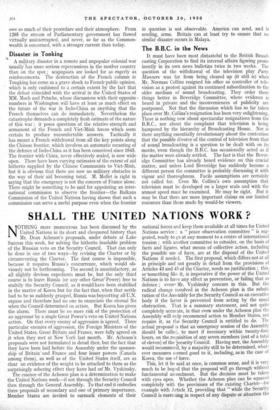The B.B.C. in the News
It must have been most distasteful to the British Broad- casting, Corporation to find its internal affairs figuring prom- inently in its own news bulletins twice in two weeks. The question of the withdrawal of the television play Party Manners was ' far from being cleared up (it still is) when Mr. Norman Collins resigned his office as controller of tele- vision as a protest against its continued subordination to the older medium of sound broadcasting. They ordpr these things better in Beveridge Committee, where evidence is heard in private and the inconveniences of publicity are postponed. Not that the discussion which has so far taken place over Mr. Collins's resignation has been very enlightening. There is nothing new about spectacular resignations from the B.B.C., nor about the complaint that television is being hampered by the hierarchy of Broadcasting House. Nor is there anything essentially revolutionary about the contention that the possible divorce of the control of television from that of sound broadcasting is a question to be dealt with on its merits, even though the B.B.C. has occasionally acted as if the matter were already settled. The fact is that the Bever- idge Committee has already heard evidence on this crucial matter, and unless Lord Beveridge has suddenly become a different person the committee is probably discussing it with vigour and thoroughness. Facile assumptions are certainly not called for. Even Mr. Collins's own assumption that television must be developed on a larger scale and with the utmost speed must be examined. He may be right. But it may be that there are more important claims on our limited resources than those made by would-be viewers.


















 Previous page
Previous page